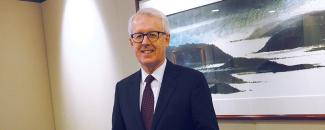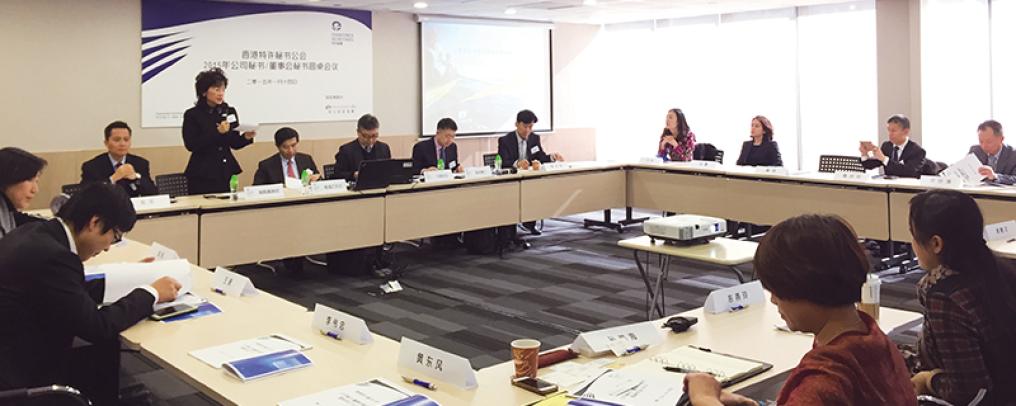The HKICS Prize is awarded annually to celebrate the achievements of leaders of the Chartered Secretarial profession. This month, the winner of this year's HKICS Prize, former President of the Institute Neil McNamara FCIS FCS, talks about his role in building the reputation of the profession in Hong Kong and gives advice on how to make a success of a company secretarial career.
Congratulations on winning the HKICS Prize. Could you tell us about your professional background?
'I did a business studies course in the UK and then joined a firm of Chartered Accountants for three years in the company secretarial area. That's when I did my ICSA exams. Then I started working for listed companies, initially in London and then for Jardines here in Hong Kong in 1989. I started as assistant company secretary, and in 1995 I became the Group Corporate Secretary, with the named company secretary being based in Bermuda. I look after five listed companies here – Hongkong Land, Dairy Farm, Mandarin Oriental, Jardine Matheson and Jardine Strategic.'Do you have any advice for young recruits to the profession?
'One piece of advice I always give is to broaden your skill set. Many members feel that taking additional qualifications will help them progress in their careers, but I think taking a course in areas such as public speaking might be a better way to do that. We do tend to be a little too technically oriented and forget that having the ability to persuade others and to have your voice heard is a big part of succeeding, both personally and professionally. In our early CPD courses we used to have sessions in public speaking but they would attract maybe six people whereas courses on the Companies Ordinance would attract over 500 people. I like to think that the six people who did the public speaking course did a lot better in their careers. To be the silent person at the end of the table doesn’t necessarily enhance your career. Getting an extra law degree or an MBA might not enhance your career if nobody knows you’ve got it or knows your skills – if you don’t say anything it won't help you very much.'You were closely involved in the signing of the Delegation Agreement with the Institute of Chartered Secretaries and Administrators (ICSA) in 2005. What are your views of the reforms to the ICSA's governance structure which were brought in last year? Do you think the new structure and strategic direction of the ICSA bodes well for the future?
'It was time for the ICSA to move forward and become more international in its approach, while remaining a UK-based profession. I think that is of value because it now has the best of both worlds – the international scope that people want to see from the profession while still being based on the values of the UK Institute.'
Do you think that there will be more convergence in the profession in the future? There are still big differences, for example, between the job of a corporate secretary in the US and a Chartered Secretary in the UK.
'Yes, I think the UK is the better model – it is more of a lawyer's job in the US and there is a broader remit in the UK.'Given that diversity, do you think the ICSA can deliver on its new mission to become the leading global professional institute in governance internationally?
'I think the ICSA has the scope to become one of the leading governance bodies. At the moment the US is very different from Europe and Europe is very different from Asia, so it is going to be very hard to get total convergence, but I think it will be one of the more powerful voices in the governance arena worldwide.'Another key area of the Institute's work which originated during your presidency was the creation of the Affiliated Persons programme. The Institute currently has over 150 affiliates in the PRC – that seems a relatively low number given that the programme was launched a decade ago.
'Well the Affiliated Persons programme was designed to attract the company secretaries of leading Mainland companies, preferably those with a Hong Kong listing who we wanted to have involved with the Institute. Many of those are in senior positions and wouldn't have wanted to take the exams and work their way up from the bottom. So this was a way of getting senior company secretaries involved with the Institute without handing out memberships. To be a member of the Institute you have to take exams and work your way up, it was never meant to be a route to membership. Having senior involvement in China, we believed, would set the right tone for the profession.'The Institute currently has over 150 students in the Mainland – do you think that we are going to see much greater numbers of PRC nationals becoming members of the Institute?
'I think we will see greater numbers, but we will have to decide how that is going to evolve. This is a Hong Kong Institute which acts as the China Division of the ICSA, but where does the balance of the membership rest? At the moment it clearly rests in Hong Kong, although if we attract a lot more Mainland China members it may come to rest on the Mainland. That would create a lot of questions about how the Institute is run and how the membership is looked after. There would also be a question about whether we should remain an international body requiring everybody to speak English and adhere to international-based examinations or whether we should become more local. We are not just an examination body, we are a professional body, so it's not just a question of getting 10,000 students to take the exams, it's to create a profession with standards and values. That's not the easiest thing to do in a country the size of China, particularly as the Hong Kong Institute is currently having to pay for it all. Goals may change, but the goal was always to take an international Institute to China. and attract people who value the international nature of the qualification. Which is why, as I mentioned, we decided to start with the leading company secretaries at the top of their businesses.'Do you expect China at some point, maybe sooner rather than later, to set up their own professional body and have their own qualification exams?
'Yes but there's room for both in the market. We position ourselves as providing an international qualification for those who have a broader remit.'You have mentioned the values of the profession – what would you say are the core values of the profession?
'Broadly, company secretaries need to have professional integrity, they are the keepers of the conscience of the company. You have to ensure that the board acts within the law and within the broader remit of stakeholder requirements these days. Being the conscience of the board is still an integral part of the way the company secretary needs to behave, which can create a lot of challenges in some jurisdictions where the directors’ commercial objectives do not necessarily sit well with the regulatory requirements.'In an interview with CSj back in 2004, you discussed the way the role of the company secretary was changing. You mentioned that the expectations of the role were greater and that members of the profession needed to rise to the challenge. Is that still true today?
'I think so. The regulators in Hong Kong in particular are very supportive of the role that the Institute has been playing in the corporate world and beyond. The Institute has done well in getting recognition in the areas it needs to look after, whether it's corporates or anti-money laundering or the governance of charitable bodies. Across the whole spectrum, its profile is much more robust than it was 10 years ago.'Do you think we'll see company secretaries becoming more aligned with the corporate governance aspects of their role?
'Governance is just one aspect. It is getting more onerous, but it is still only one aspect of the company secretary role. Company secretaries tend to take on responsibilities which align with the skill set and experience of the individual. So you’ll find in Hong Kong some company secretaries look after property, some look after HR, in addition to their other duties – it very much depends on their competencies. I think that just saying that we are "governance professionals" would be limiting us to one part of what we are capable of doing.'The Australian and New Zealand divisions of ICSA recently changed the names of their institutes to become 'governance institutes' in a bid to be more inclusive of the other professionals included in their memberships – such as lawyers, accountants, risk professionals, etc – would this be something the HKICS should consider?
'I don’t think the current name has prohibited other professionals from joining the HKICS, so I wouldn’t say that is relevant. I think if you start calling yourself a "governance institute" people will think of you as an audit and compliance department and that is not what you want.'
Some have suggested that being seen as governance professionals would help counter the misunderstanding that the company secretary is only an administrative position?
'Well, this has been a constant debate for that last 20 years but I still don’t think it's worth chucking it all in and calling ourselves governance professionals, because that does limit the possibilities. I think it is a little naïve to think that we can convince people simply by changing our name – the people we want to convince already know to a certain degree what we do. I think calling yourself a governance professional starts making you sound like internal audit; it puts you in a little slot to one side and caps you at the same time. I think if we went down that route we'd probably find ourselves changing the name back again five years later.'Can we talk about another area of the Institute's work where you have played a key role – continuing professional development?
'We introduced CPD in the early 1990s and then, when I was President, we introduced the Practitioner's Endorsement scheme which requires holders to do at least 15 hours of CPD per year, demonstrating that they are up to speed.
At that time we recommended to the ICSA to make CPD mandatory, but it didn’t go down too well. We felt that if anyone was going to take us seriously we should take ourselves seriously first. Part of that process is keeping the Institute's members up to speed and being seen to be up to speed. But we weren't allowed to bring it in because, at that time, different ICSA institutes couldn't do different things. We were told that international Council would have to approve it across the board.'
Mandatory CPD was eventually launched in 2011, are you pleased with the way things have evolved?
'I am glad that it is up and running, it shows that we take ourselves seriously. If we lose a few people because they don’t want to do it, well they are probably not people we want as our members. The reality is that to maintain credibility with regulators we have to have members who are seen to be up to date with regulatory requirements, so it's the right thing to do.'You were the founding Chair of the Company Secretaries Panel – could we talk about the aims of the Panel?
'We set up the Company Secretaries Panel in the mid-1990s partly because we noted that a lot of the company secretaries in listed companies in Hong Kong were not in fact HKICS members. The panel was to get a significant proportion of the top Hang Seng companies formally together to discuss matters of interest. That meant that when we made submissions to the stock exchange we represented 80% of the Hang Seng Index. So it was to draw in senior company secretaries who may not have been our members and to be a useful tool for the Institute. The panel still exists, it still invites regulators for lunch and makes submissions on behalf of company secretaries.'One last question – do you think the HKICS prize is a good way for the Institute to get its message out there?
'It is a good way for the Institute to raise its profile and these initiatives are certainly needed. Regulators change and things move on, so you’ve got to create an environment to attract the right levels of membership and inspire the right people within the membership to achieve what they can achieve.'SIDEBAR: Career notes
Neil McNamara FCIS FCS served as HKICS President from 2004 to 2005. He was the founding Chair of the Institute's Company Secretaries Panel. He has also served as the Institute's Vice-President; Chair of the Professional Development and Nomination Committees; a member of the Technical Publications and Membership Committees; and a member of both HKICS Council and ICSA International Council.
He has played a key role in building the reputation of the Chartered Secretarial profession in Hong Kong, including:
- launching the Institute's CPD programme and promoting mandatory CPD requirements for Chartered Secretaries
- launching the Institute's Affiliated Persons programme to promote the Chartered Secretarial profession in Mainland China, and
- negotiating the Delegation Agreement with the ICSA in 2005 which recognised the HKICS as the ICSA China Division.



